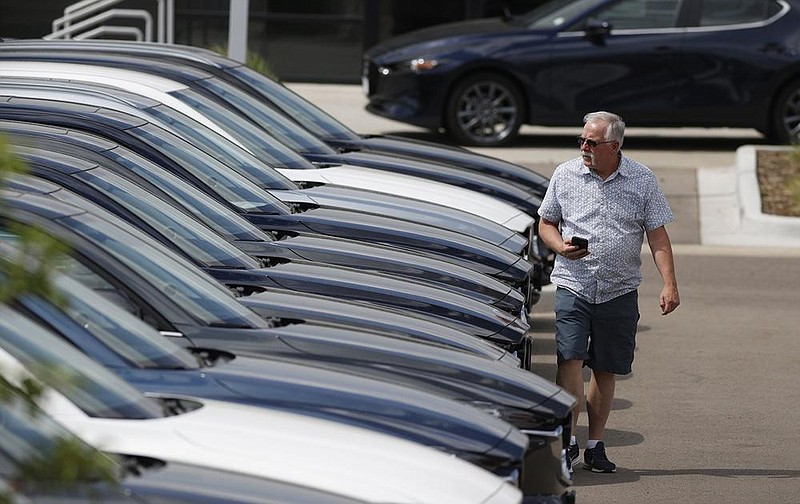Consumer Reports' latest auto-reliability survey has a sobering message for owners of the newest electric vehicles: You're likely going to have some gripes.
Tesla Inc.'s new Model Y crossover failed to get a recommendation from the nonprofit because of what it described as "basic" manufacturing flaws such as misaligned body panels and mismatched colors. One owner even reported finding human hair stuck in the paint job, Consumer Reports said in a statement about its survey of members who own more than 300,000 vehicles from model years 2000 to 2020.
Below-average reliability assessments for both the Y and Model S sedan put Tesla second from last in the magazine's overall automotive ranking. But it wasn't alone among brands with electric-car woes.
Porsche's Taycan, the Volkswagen AG-owned brand's first foray into pure battery power, lost its recommendation because of the potential for finicky connectivity and infotainment technology. Consumer Reports is withholding further judgment until it collects more data. It also said sister VW unit Audi's electric e-Tron SUV also rated "much worse than average" because of what it called drive system and power equipment flaws.
Porsche said it looks forward to Consumer Reports' evaluation of the Taycan once it has enough data to do so.
"However, we feel that judging the Taycan based on broader industry trends rather than specific data from the car is potentially misleading to consumers," Marcus Kabel, a Porsche spokesman, said in an email.
Mazda Motor Corp. topped the ranking for the first time ever by adopting only modest redesigns, a path taken by larger Japanese peer Toyota Motor Corp. and its luxury Lexus brand.
Some Mazdas don't have touch screens, which often are a source of problems in the surveys, said Jake Fisher, Consumer Reports' senior director of automotive testing. And the company still uses six-speed automatic transmissions while others have gone to more efficient but sometimes glitch-prone continuously variable or nine- and 10-speed transmissions, he said. Yet the company's cars and SUVs are still fun to drive, Fisher said.
After Mazda, Toyota, Lexus, Buick and Honda rounded out the top five brands. Following Lincoln and Tesla, Volkswagen, Mini and Ford were the five lowest-scoring brands.
Ford's premium Lincoln brand ranked dead last in the reliability survey because of the new Aviator and Corsair, which share a platform with the Explorer. Ford made a familiar mistake in trying to introduce too many new elements at the same time, Fisher said.
Normally high-scoring Buick jumped two spots after canceling two unreliable cars, the Regal and Regal TourX, Fisher said.
Automakers typically encounter the most glitches when they put new technology on a car for the first time. The latest crop of electric vehicles may be particularly prone to flaws as they are the very first of dozens of new models expected to debut over the next three years.
Consumer Reports is predicting below-average reliability for a host of these new electric cars, including Ford Motor Co.'s Mustang Mach-E, Daimler AG's Mercedes EQC and Amazon.com Inc.-backed Rivian Automotive Inc.'s R1T pickup, said Fisher. He's also re-evaluating how he measures quality to adapt to the new electric era.
"They do have simplicity, no transmission or fuel system," Fisher said of electric models. However, "EVs are new to the manufacturers and tend to be coupled with a lot of new tech, which is more opportunity for things to go wrong."
Tesla is unique in that it's offered battery-powered cars for years, but most of its problems have to do with manufacturing 101, Fisher said. Of its four models, only the Model 3 sedan earned a coveted recommendation from Consumer Reports. The world's most valuable car maker ranked 25th out of 26 brands covered in the survey.
"They're almost taking for granted the basics that car companies have to deal with," Fisher said. "They need to take that stuff seriously, too, and they could have a very compelling model lineup."
Tesla Chief Executive Officer Elon Musk doesn't see that as a long-term problem for his car brand. Tesla's main competitive strength will be "primarily manufacturing" in the future. "This is counterintuitive, but I'm quite confident this will be what happens," he said on Tesla's third-quarter earnings call.
Tesla didn't respond to an emailed request for comment.
Information for this article was contributed by Gabrielle Coppola of Bloomberg News and by Tom Krisher of The Associated Press.
